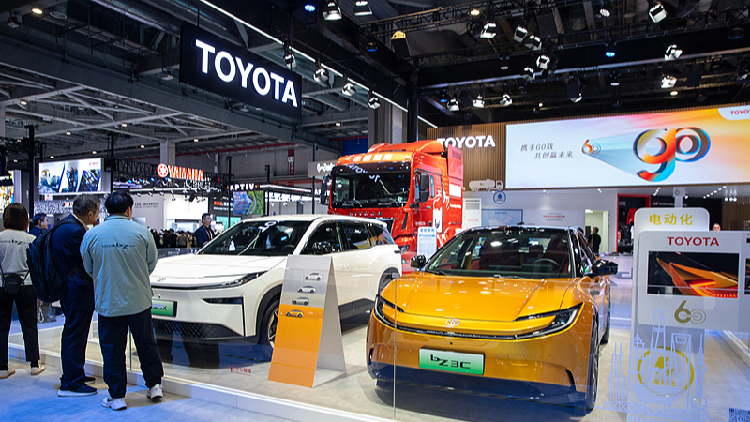INSUBCONTINENT EXCLUSIVE:
Japanese automaker Toyota Motor Corp
on Tuesday signed an agreement to establish a wholly owned electric vehicle (EV) plant in Shanghai, in a strategic move to bolster its
presence in China, the world's largest automotive market.In the strategic cooperation agreement with the Shanghai municipal government,
Toyota commits to invest a total of 14.6 billion yuan (about $2 billion) into the new energy vehicle (NEV) project in Jinshan District,
which focuses on the research and development, production and sales of Lexus EVs and EV batteries.The investment underscores the
attractiveness and openness of China's huge market
As a leading destination for foreign investment, the country has been continuously pushing forward opening up and improving its business
environment while the world grapples with rising protectionism and economic uncertainty.The project will introduce groundbreaking
technologies to create a leading carbon neutrality model project that will have significant influence both in China and globally, noted
Tatsuro Ueda, chief executive officer of China Region and chairman of Toyota Motor (China) Investment Co., Ltd."Additionally, we look
forward to collaborating with more local suppliers to showcase the competitive advantages of China's NEV industry chain to the world and
jointly promote Chinese technologies to benefit the global market," he added.This marks another globally influential NEV project in
Shanghai, after Tesla's Shanghai Gigafactory
It further demonstrates Shanghai's determination to expand high-level opening up and accelerate the creation of a world-class NEV industry
cluster.Peng Xijun, general manager of Shanghai Xinjinshan Industrial Investment Development Co., Ltd., a local partner, said Toyota has
acquired 1,692 mu (112.8 hectares) of land for the first phase of the project.Construction is slated to begin in June, with production
expected to start in 2027, according to the plans of Toyota, the world's top-selling automaker.The new plant marks a significant investment
in enhancing Toyota's R-D and production capabilities specifically tailored for the EV sector in China.Toyota did not disclose the
production capacity on Tuesday, but it said in February that the initial production capacity would be around 100,000 units per year, and the
project is expected to create approximately 1,000 new jobs during the start-up phase.The car manufacturing plant, a supplement for the
automotive industry chain of Jinshan District, will provide opportunities to upgrade the industrial chain and even benefit automotive
suppliers in the whole Yangtze River Delta region, Peng said.According to the agreement, Toyota and Shanghai will also carry out extensive
cooperation in the upstream and downstream sectors of the industry chain, intelligent driving, hydrogen energy, automotive battery recycling
and reuse, and logistics and supply chain.China's NEV industry has experienced exponential growth, propelled by a dual engine of robust
technological innovation and the government's unwavering dedication to green development and sustainable transformation
This strategic synergy has not only catalyzed unprecedented market demand but also accelerated the industry's dynamic expansion.China's NEV
sales soared 47.1 percent year on year to 3.08 million units in the first quarter, accounting for 41.2 percent of total vehicle sales in the
period, according to the China Association of Automobile Manufacturers.Toyota's increased investment is a microcosm of multinationals
deepening their presence in China, noted Bai Ming, a researcher at the Chinese Academy of International Trade and Economic
Cooperation.Citing official data that from January to March 2025, China saw the establishment of 12,603 new foreign-invested enterprises,
which registered a 4.3 percent increase year on year, Bai specified that it shows the Chinese market remains "highly attractive" to foreign
companies.United States carmaker Tesla's new Megafactory in Shanghai launched production in February, marking a significant expansion of
the company's presence in China
The new Megafactory, dedicated to manufacturing energy-storage batteries known as Megapacks, is its second major facility in Shanghai and
the first of its kind outside the United States.In March, German carmaker BMW partnered with Chinese tech giant Huawei to develop an in-car
digital ecosystem specifically tailored for the Chinese market.Also in March, Volkswagen Group signed a strategic cooperation agreement with
China's First Automobile Works to introduce 11 new models, including 10 NEV models, specifically tailored for the Chinese market, starting

